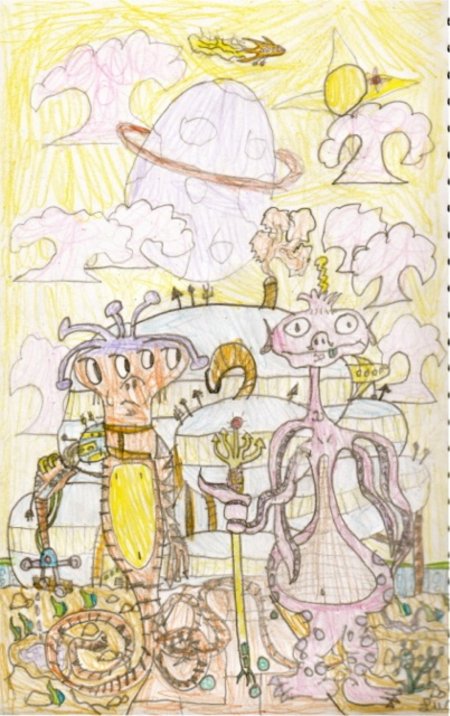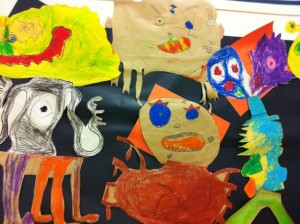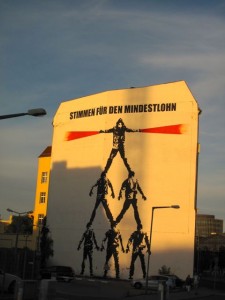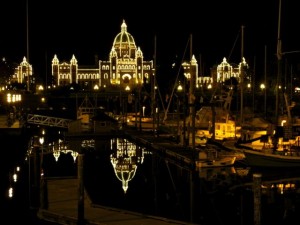Politics
A Question of Size
“We may not be big but we’re small!”
As CBC radio listeners know, that’s the motto of the Vinyl Café, the vinyl record store at the heart of Stuart McLean’s storytelling series.
I think the motto counterbalances another common theme of our times: “Bigger is Better”. A concept which often leads to trouble economically, politically, and environmentally.
The Vinyl Café motto is also a good fit for Lions Bay Community School, a primary school in School District 45 which enrolls approximately 60 students per year in kindergarten to Grade 3. A privately run preschool also operates on the premises.
In June, I attended the school’s leave-taking ceremony for its Grade 3s, a ceremony which marks their “graduation” and acknowledges their future status as intermediate students at other schools starting in September.
Lions Bay, it seems to me, is so big in what it does even though it is small.
Why?
Part of it is the setting. Nestled in the forest, the school seems to be swimming in an ocean of green.
Part of it is the architecture. Now over 30 years old, the school is built on an open-concept plan which allows an unparalleled flow between learning spaces and allows the teaching staff an exceptional amount of flexibility.
Part of it is the community. Families who choose to live in Lions Bay have made a specific lifestyle choice and they are active participants in the school because it is a major focus for the community.
There are challenges, too. Because it is so highly dependent on area demographics, enrollment at the school can only be maintained as long as there are young families in the area or willing longer-distance commuters (for example, if Squamish families or Horseshoe Bay residents were to choose the school for their children).
In addition to the excellent teaching staff, the supportive community, and the outstanding physical environment, size is something else that gives Lions Bay an edge. Being small helps the school fulfill its mission statement “to provide a safe learning environment and strive to enable students to become confident learners”.
The size of the school, in my opinion, keeps the student experience at the heart of operations by allowing a higher degree of personal attention. It has also sparked innovation in pedagogical approaches.
These factors have all combined to ensure success for these young students.
Being small can be effective.
Which brings me to the measures being taken to restructure the bargaining framework in BC’s public education system. Measures which I hope are not a prelude to regionalizing or eliminating Boards of Education.
As John Abbott, President of the 21st Century Learning Initiative, cautioned during a visit to West Vancouver earlier this year, losing local governance puts the future of learners at risk by distancing the local community from decision-making.
So here’s what I hope our provincial government and the leadership of BCSTA remember as they work together during the remaining days of summer.
Bigger is not always better.
Artwork by Lions Bay students on display in the gym.
Do I Want To Know?
Ignorance is bliss.
Or so they say.
And as we hurtle through the German countryside, on this train voyage from Berlin to Frankfurt, on the last leg of our summer adventure abroad, I believe it may be true.
Throughout this trip, I’ve had access to wireless connections and have checked my email regularly, followed Facebook postings and Twitter messages, but not to the same extent I do at home.
I haven’t read the newspaper each morning, I haven’t listened to broadcast news, and I haven’t been voraciously consuming the ups and downs of world events, whether trivial or significant. It helps that many of our accommodation spots have not provided access to a television or that we’ve been too busy exploring to watch.
So while I’ve been connected, I haven’t been obsessed and that’s opened room in my thoughts and daily experience to a stronger sense of well-being.
Which is an odd place to be for someone who is an advocate of digesting information regularly, of learning, of being aware that the world is so much more than our immediate circles of influence.
So if ignorance is bliss, why bother with education?
In thinking about this question, I realize how value-laden the field of education is as is the contemplation of what constitutes the qualities of our existence as social beings.
We talk about believing in better, but what’s better?
We talk about the value of knowledge, but what is knowledge?
We talk about leading good lives, but what constitutes a good life?
In addition, as I contemplate the historical record (traveling in Europe seems to make history somehow more real and pressing), I realize that crimes and atrocities, throughout the centuries and in our own day, are or have been committed by well-educated people.
Education has not acted as a barrier to tragedy, war, deprivation, suffering, inequality, and injustice.
And while I have a feeling the key is to keep asking questions rather than settling on fixed answers, there is one conclusion I feel able to draw with some certainty.
The most important result of education is to enable people to become and to be critical thinkers. And while the search for consensus may be integral to making progressive changes (what is progress? why change?), individual voices are needed now more than ever as is tolerance for different points of view.
And that’s a troubling aspect of political life in Canada and elsewhere along with the evolution of our mainstream media systems. It seems the goal is to manipulate citizens into thinking en masse by removing dissension and erasing individuality.
I can’t help feeling that we should – at this point in time and with the lessons of history – know better.
Ignorance may be bliss, but, as my nephew says (he’s recently graduated from the University of Bradford Peace Studies Department) “blissed” ignorance is not just.
Perhaps that’s the ultimate purpose of education then: to establish, maintain, and sustain just societies.
If so, let’s get on with it.
Being Human and the Loss of Perspective in Politics
Errare humanum est [To err is human]. – Anonymous: Latin
For to err in opinion, though it be not the part of wise men, is at least human. – Plutarch (46-120 C.E.)
I presume you’re mortal, and may err. – James Shirley (1596-1666)
To err is human, to forgive divine. – Alexander Pope (1688-1744)
Then gently scan your brother man,/ Still gentler sister woman;/ Though they may gang a kennin’ wrang. To step aside is human. – Robert Burns, Address to the Unco Guid [1787]
“Address to the Unco Guid’ makes the point that it is this natural sympathy and compassion that is important in society: not self-righteous condemnation.” – Juliet Linden Bicket
I remembered Alexander Pope’s words this week as I watched events unfold in the BC provincial election. When I checked my copy of Bartlett’s Familiar Quotations to verify them, the footnotes led me to other quotes on the same theme and to Google for the full text of the Burns poem where I found the comment by Bicket.
And despite these wise words, which span approximately 2,000 years of human history, it would seem that in our time the motto has become “to err is human and to forgive is impossible”.
Or maybe even more to the point, “to err is human and let’s make sure everyone’s mistakes are never forgotten”.
And given our rush to judge others on this principle, it seems to me that the greatest disincentive to running for public office has become the process of getting elected.
While this trend has been emerging over time, it seems to have bloomed with noxious fervour in this election.
We’re all on the lookout for “bozo eruptions”. That’s the term applied to the actions of candidates who slip up in real time, but everything has become fair game: whether a word that’s said today or over 20 years ago, whether a misstep now or one from long ago.
And I have to ask what added value, if any, is there in this “new” way of doing politics. Does it benefit voters? Does it allow society to progress? Does it ensure the health and vitality of our democratic institutions?
Why?
Because we have made perfection a condition of holding office and yet no one is perfect. It’s not human.
Because we have lost perspective. If anything from any point in our lives can be construed as a liability, then we lose the ability to distinguish between misdemeanors and serious crimes.
Because we have forgotten that living involves choices and that we sometimes make bad choices, particularly when we’re young. But we learn and those mistakes do not necessarily or automatically make us incapable, incompetent, or untrustworthy for life.
Because setting up impossible standards for conduct and behaviour lead to unreasonable controls being implemented to maintain power once it’s been secured.
And that’s why we have a parliament full of men and women commonly derided as trained seals.
We have parliaments and legislatures which we denigrate and political representatives whom we disrespect. We have governments, political parties, and candidates who are more focused on slander and defamation, on digging up the dirt, than they are on policy and good governance.
And that’s an unforgivable mistake.
The Arts In Education – For A Better World
What a relief! Mark Mercer’s article in this morning’s newspaper reiterated that “universities are about education, about learning for the sake of learning” and that “university done rightly is great preparation for life”.
This was a welcome contrast to Margaret Wente’s recent diatribe against the Occupy protesters. With a swipe of her pen, she denigrates the value of the humanities. She seemingly fails to recognize that there are likely as many mechanical engineers out of work today as there are sociology students trying to find their way in life.
The business challenges we face and the deficiency in employment opportunities for young adults is not due to the educations they pursue; rather it reflects the reality of the structural weaknesses and flaws in our economies and societies.
And while we struggle to address these serious questions, as educators we need to ensure that we don’t lose sight of the value of the humanities in education and the value of the arts in our students lives.
 When I walk down the hallways at my son’s school, I’m always struck by the amazing artwork the students produce: artwork directly related to the curriculum, the topics they are studying, and their learning. A lot does get done and I think that a lot more needs to be done to without imposing a further burden of delivery on teachers.
When I walk down the hallways at my son’s school, I’m always struck by the amazing artwork the students produce: artwork directly related to the curriculum, the topics they are studying, and their learning. A lot does get done and I think that a lot more needs to be done to without imposing a further burden of delivery on teachers.
What if in-residence programs were implemented? For example, what if a published author served as writer-in-residence for the district? We have great visual artists on the North Shore — why can’t we look at having them conduct classes or organize field trips to their home studios throughout the year? Why can’t a professional dancer come in on an extended basis, once a week, to help choreograph a holiday show? Could we organize visits to Sinfonia’s (the North Shore’s professional orchestra) rehearsals? Why isn’t it automatically on the calendar every September and October for classes to take in sessions offered during the Vancouver International Writers Festival or Vancouver International Film Festival?
Some schools may be pursuing these sorts of projects and some schools aren’t. These type of initiatives, in my mind, would compliment teachers’ efforts and would be most viable in conjunction with greater support for specialist teachers (music, art, drama, dance, etc.) already hard at work. I also see that such programs would be most economically effective if delivered on a resource-sharing model between the district, the schools, and the Parent Advisory Councils (PACs).
I’m not advocating a specific approach or model because I don’t have all the information necessary to say which one will work the best. What I do know is that there is room to do more, much more. And we must do more because the arts, to me, are integral to the human experience and our children’s learning will be enhanced if art is more fully-integrated in their daily routines as a central component rather than as simply an adjunct.
I agree with Martha C. Nussbaum who writes in her 2010 book Not For Profit – Why Democracy Needs the Humanities:
“If we do not insist on the crucial importance of the humanities and the arts, they will drop away, because they do not make money. They only do what is much more precious than that, make a world that is worth living in, people who are able to see other human beings as full people, with thoughts and feelings of their own that deserve respect and empathy, and nations that are able to overcome fear and suspicion in favor of sympathetic and reasoned debate.”
I think there’s room to dispute her contention that the arts do not make money (look at this recent article by John Doyle on the profits made by private television broadcasters), but the point is that there is inherent value in the arts and humanities which we risk losing in a world solely focused on measurable utility and on money.
And isn’t that the ultimate purpose of education, as Nussbaum says, to “make a world that is worth living in, people who are able to see other human beings as full people”?
So let’s do that. Let’s make sure that our curricula do not sacrifice the arts. Let’s not make this a lesser world, but a better one.
All Candidates Meeting – October 20th
It was an interesting start to the evening: when I dropped my son off at the community centre for his activity, we had a small personal collision – his head rammed into my nose by accident. This wasn’t exactly the preparation I’d been counting on for the All Candidates Meeting hosted by the West Vancouver Citizens for Good Government on Thursday night! But, as the saying goes, the show must go on.
It was a successful outing. I appreciated the opportunity to address a gathering of West Vancouver residents and voters, and was grateful to the number of friends who were able to attend the event — especially those who don’t normally follow municipal politics and those who drove a significant distance!
Here are the words I shared with the audience:
If you’re an Ian Rankin or Peter Robinson fan, you may think I’m crazy for giving up my ticket to see these two authors speak tonight at the Vancouver International Writers’ Festival.
Rather than a lapse in judgement, I hope you’ll see being here tonight as evidence of my commitment to this election.
Good evening. I’m Luc’s Mom, Reema Faris, and I’m running as a candidate for the position of Trustee with the West Vancouver Board of Education.
Why? That’s a good question. Let me start by saying that I profoundly believe in the value of education and the benefits of learning, and I have a passion for the public education system.
Let me also say that may be only part of my answer. And before you shrug and wave me off for being indecisive, let me explain.
I take great comfort in the question why. As long as I’m asking why, I’m thinking, I’m reflecting, I’m challenging. I am looking for answers rather than assuming I have all the answers. I’m seeking information rather than dictating the way that things ought to be perceived.
To me, this questioning is not about undermining a system and disregarding the work that’s been done. It’s about validating what you believe, being responsive and strategic — making changes when they’re needed, when they’re necessary, and making them at the right time.
This critical thinking skill is a key one for students especially in our increasingly fast-paced, dynamic world. It’s part of developing a sense of ownership for one’s own learning.
In addition to ensuring that students have the opportunity to develop these skills, there are a few more issues I would like to look at if elected.
I would like to work closely with the District team and the other Trustees to ensure that the digital learning environment is one which prepares students for the skills they need without overlooking some of the key concerns parents have about the speedy introduction of technology into the curriculum and the classroom. This is not about going back to a pre-electronic age, it’s about being smart in the way in which we embrace the electronic era.
What measures can we take to enhance community connections and make better use of combined resources? Can we provide better leadership and communications training for administrators, teachers, and staff? How can we incorporate the Arts into our program delivery to ensure that the value of art is held dear by our children?
Did I mention how much I love asking questions?
I would like to commend Jane, Cindy, and Dave for putting their names forward once again. My congratulations to both Carolyn and Christine for having the courage to leap into the fray.
My thanks to the West Van Citizens’ for Good Government for putting this event together and my sincere admiration to all of you for taking the time to be here and to be a part of this very important process.
My name is Reema Faris and I hope I can count on your support at the ballot box on November 19th.
Thank you.


